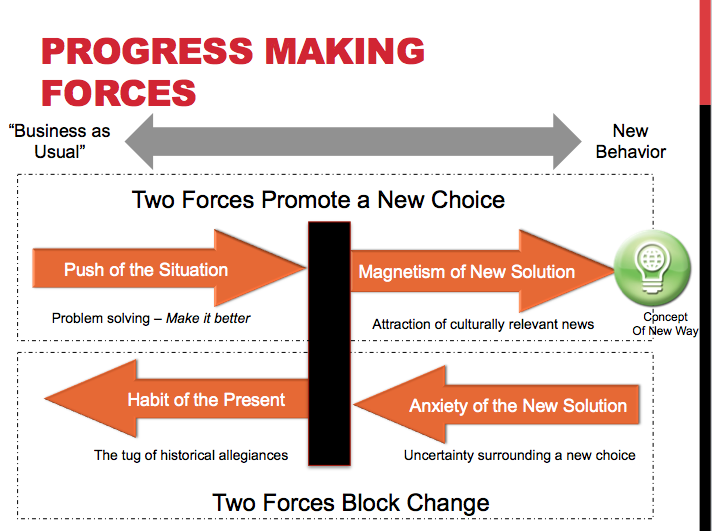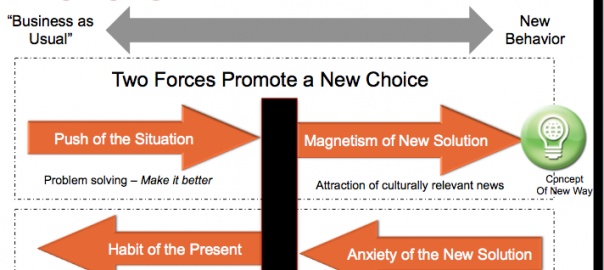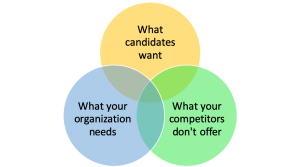— January 15, 2018
There’s a lot of conversation about Jobs To Be Done in innovation and start-up circles. There’s a certain degree of hype about it, but at its core is common sense and a good corrective to corporate and marketing myopia. So what are the key principles of Jobs To Be Done?
#1 People don’t want your product, they want an outcome
Yeah, tell us something we don’t know. People buy benefits, not products. Marketing basics.
Jobs To Be Done (JTBD) recognises this, but takes it further. It demands a ruthless focus not on what you make, but the outcome people seek. For Jobs To Be Done guru Alan Klemant, this principle is perfectly encapsulated by the famous statement from Revlon founder, Charles Revlon: “you don’t buy cosmetics, you buy hope.” If you like you can see ‘job’ and ‘outcome’ as interchangeable, although you can’t hire and fire an outcome.
Philosophically, JTBD sees people as progress making creatures. We constantly seek better versions of our lives and ourselves. Often, because we’re social creatures, we copy other people’s versions of themselves. These units of progress can be thought of as jobs. We hire products or services to do these jobs for us, and switch when something does the job better.
#2 We’re wired for dissatisfaction
“Customers are always beautifully, wonderfully dissatisfied, even when they report being happy and business is great. Even when they don’t yet know it, customers want something better. No one asked for Amazon Prime, but it sure turns out they wanted it.” Jeff Bezos
Because we seek progress and measure ourselves against others, we’re always in the market for improvement. Depending on your point of view, we are beautifully or maddeningly dissatisfied.
#3 Recognise that customer jobs don’t change much, but solutions do
Most of our jobs (need for progress) change very little. Transport with minimum fuss and friction. Food that sustains us. Easy ways of trading with one another. We’re always trying to design these into our lives. As Alan Klement, JTBD guru, says: “Solutions come and go, while jobs remain largely the same”.
The emotional & social jobs remain largely unchanged, although the functional solution changes. For example, the job is to be able to cherish your memories, the solution used to be a photo album. In a smartphone age, it’s cloud-based storage.
#4 Identify the jobs-to-be-done by observation and smart qualitative interviewing
People often find it difficult to articulate the progress they are seeking, because they reference everything back to current products. That’s the danger of asking people about their ‘needs’.
You can learn a huge amount from intelligent qualitative interviews. Prioritise the following:
- Observation Learn to talk less and observe more.
- Timeline Trace a timeline from first thought to purchase / experience.
- Focus on struggles not ‘needs’ If you ask a distracted friend what they ‘need’ they’ll say ‘a holiday!’ If you ask them what’s the main thing they’re struggling with, they might say ‘stress at work and fear of burning out.’ Two very different solutions could emerge. One’s a trip abroad, the other could be a trip to the appstore to download Headspace.
- Seek contrast The real insight lies in the contrast between what someone uses and what they used to use.
- Understand forces The decision to hire a new product is the result of several forces which interact. At FreshMinds, we love this model from JobsToBeDone.org

#5 Create a simple, powerful articulation of the job ‘story’
It’s vital to be able to articulate the job story – this is the brief for the opportunity. Use the structure of: WHEN (situation), I WANT TO (motivation) SO I CAN (expected outcome).
The following is a job story when you want people to be impressed by your photos. The solution was photo-editing software but increasingly, Instagram is being hired to do the job.
When I want to share a photograph I’ve taken of someone or something that matters to me
I want it to look compelling or beautiful
So I can feel that others appreciate my skill or my life
The next example is when the outcome is to avoid the airport departure stress of the family holiday and feel like an uber-parent: an outcome that people currently struggle with. Airport marketers take note.
When my family arrive at the airport for our annual holiday
I want their different needs to be met smoothly & easily but us to still feel together
So I can relax and feel like I’m a competent Dad / Mum.
At FreshMinds, Jobs To Be Done excites us because it’s an act of focus. It forces you to pay attention to:
1. What people are struggling with
2. The outcome they seek
3. How and where a client can help
With thanks to Alan Klement who has developed a range of useful resources on Jobs To Be Done.
Business & Finance Articles on Business 2 Community
(120)
Report Post







